Versuchen GOLD - Frei
Swami Ramakrishnananda: His Contribution to the Philosophical Tradition of the Ramakrishna Order
The Vedanta Kesari
|July 2020
Born on 13 July 1863 in Ichapur village, West Bengal, to parents who were sincere spiritual aspirants, Shashi Bhusan Chakrabarty was a brilliant student of Sanskrit and Mathematics, and a scholarship holder of Calcutta University. He came to Sri Ramakrishna in 1883 and soon became his close disciple. After Sri Ramakrishna’s mahasamadhi in August 1886, in keeping with his matchless devotion and service to the Master, Swami Vivekananda gave him the sannyasa name Ramakrishnananda. On Swamiji’s instruction, he came to Madras (now Chennai) in March 1897 and worked tirelessly to establish Sri Ramakrishna Math, Chennai and spread the Ramakrishna – Vivekananda Movement in South India. His lectures, writings, and letters are available in three volumes published by Sri Ramakrishna Math, Chennai.

To mark his birth-tithi on 18 July 2020, this article is reproduced from his 150th Birth Centenary Souvenir published in 2012 by Sri Ramakrishna Math, Chennai.
The Unique Worshipper
A sultry day of June in Madras, a sannyasi had just laid down for rest. He, however, felt very uneasy because of excessive heat. He became quite restless, and then all on a sudden he got up and entered the shrine quietly, thinking that the heat was unbearable also to his Lord. So, he began to fan the portrait of his Master and then flowed a stream of soft, moving words from his lips: “My Master! O the beloved of my heart! O my Master, O the beloved of my heart!” Thus he went on for two hours. As he fanned and hummed these endearing words he forgot all about his surroundings, all about his existence and all about the burning heat, only the living presence of the Master was real to him.
One evening a group of devotees came to the Math to meet him. They understood that he was in the shrine and waited for him. Presently they heard him railing out in loud and angry tones: “You have brought me here, old man, and left me helpless! Are you testing my powers of patience and endurance? I will not go and beg hereafter for my sake or even for yours. If anything comes unasked, I will offer it to you and share the prasada. Or I will bring sea-sand for offering to you and I shall live upon that.”
The devotees, who were waiting outside the shrine, did not quite follow his words. They guessed that he was quarrelling with somebody. But, in fact, he
Diese Geschichte stammt aus der July 2020-Ausgabe von The Vedanta Kesari.
Abonnieren Sie Magzter GOLD, um auf Tausende kuratierter Premium-Geschichten und über 9.000 Zeitschriften und Zeitungen zuzugreifen.
Sie sind bereits Abonnent? Anmelden
WEITERE GESCHICHTEN VON The Vedanta Kesari

The Vedanta Kesari
Panchakroshi Parikrama of Varanasi
At the snow-capped Kailas, the Divine Lord Shiva was seated with Mother Parvati.
5 mins
February 2023
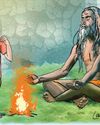
The Vedanta Kesari
Gadai and the Monks
A fictional narrative based on incidents from the childhood of Sri Ramakrishna.
2 mins
February 2023
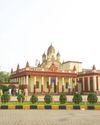
The Vedanta Kesari
Chintayo momo maanosho Hori...
Sri Ramakrishna loved songs. There probably was no normal day when he did not sing some songs.
4 mins
February 2023
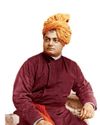
The Vedanta Kesari
The Vedanta Vaccine
The world is still struggling under the impact of the pandemic due to Covid-19 for the last three years.
5 mins
February 2023
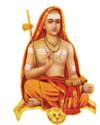
The Vedanta Kesari
Chandrakirti's Chariot: Self in Madhyamaka Buddhism and Advaita Vedanta
The goal in Advaita Vedanta is the cessation of suffering and the attainment of true fulfillment. Suffering, according to this school, is due to ignorance of the true nature of the self and consequent erroneous identification with the body-mind.
13 mins
February 2023
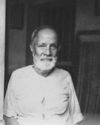
The Vedanta Kesari
Reminiscences of Sargachhi
Question: यद्यदाचरतत श्रेष्ठसतत्तदरेवरेतरो जनिः। ‘Whatever a superior person does, others do the same thing!’ (Gita 3:21) – What does this statement mean?
6 mins
February 2023
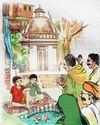
The Vedanta Kesari
THE AUTUMN FESTIVAL
A fictional narrative based on incidents from the childhood of Sri Ramakrishna.
2 mins
October 2022
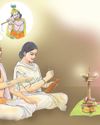
The Vedanta Kesari
Bards of Guruvayur: Vilwamangalam II
Saints of India
12 mins
October 2022
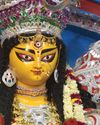
The Vedanta Kesari
In the Universal Mother’s Divine Playground
Swami Vivekananda never taught the worship of Mother Kali. In a letter to Mary Hale he writes, “Kali worship is not a necessary step in any religion.
11 mins
October 2022
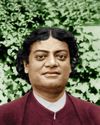
The Vedanta Kesari
Swami Vivekananda: A Sportsman Par Excellence
In various books and articles, Swami Vivekananda has been called a spiritual leader, a prophet, a patriot, a social reformer, a philosopher, a yogi, a writer, an orator, an educationist, a musician, and so on.
6 mins
October 2022
Translate
Change font size
